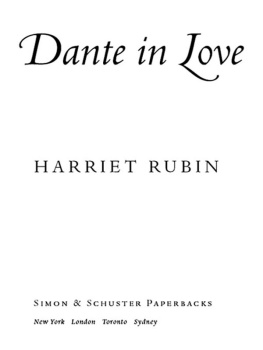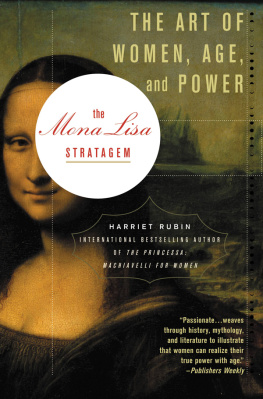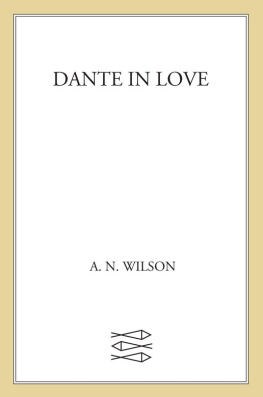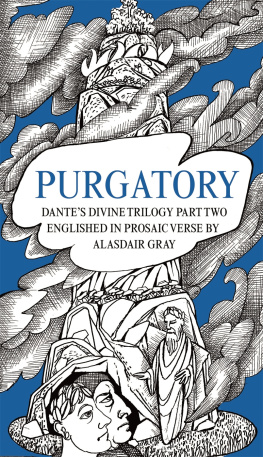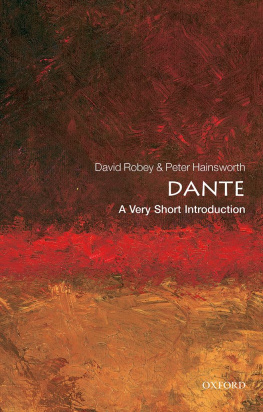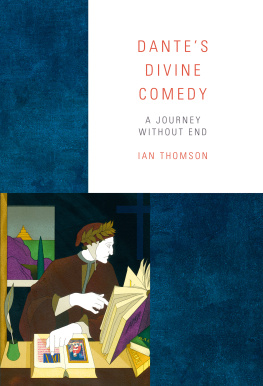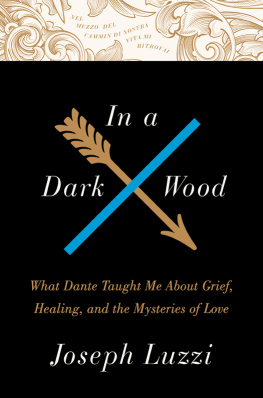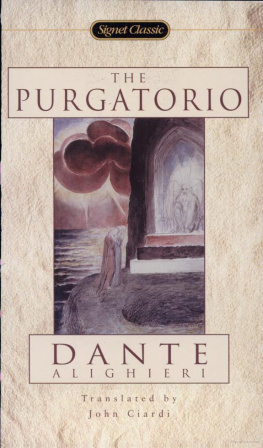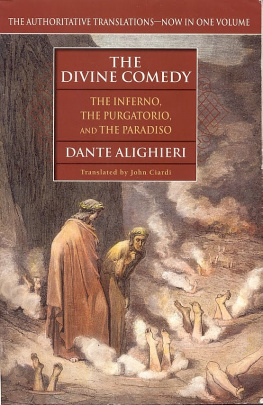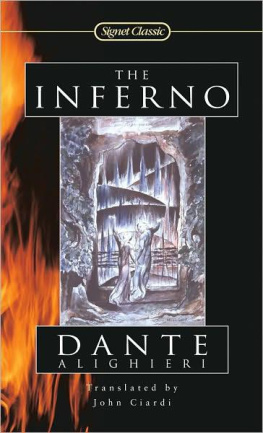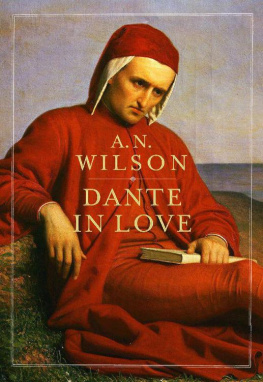
SIMON & SCHUSTER
Rockefeller Center
1230 Avenue of the Americas
New York, NY 10020
Copyright 2004 by Harriet Rubin
All rights reserved, including the right of reproduction
in whole or in part in any form.
First Simon & Schuster paperbacks edition 2005
SIMON & SCHUSTER PAPERBACKS and colophon are registered trademarks of Simon & Schuster, Inc.
Book design by Ellen R. Sasahara
The Library of Congress has cataloged the hardcover edition as follows: Rubin, Harriet.
Dante in love : the worlds greatest poem and how it made history /
Harriet Rubin.
p. cm.
Includes bibliographical references and index.
1. Dante Alighieri, 12651321. 2. Divina commedia. I. Title. PQ4390 .R778 2004
851.1dc22 2004041808
ISBN-13: 978-0-7432-8256-7
ISBN-10: 0-7432-8256-6
Visit us on the World Wide Web:
http://www.SimonSays.com
For Steven Lowenstam (19452003)
di tante cose quant i ho vedute,
dal tuo podere e da la tua bontate
riconosco la grazia e la virtute.
through your power and your excellence alone
have I recognized the goodness and the grace
inherent in the things I have been shown.
(Paradiso 31.8284; trans. Ciardi)
Contents
The High Middle Ages reached their greatest height in a brief thirty-year period, when the thirteenth century ended and the fourteenth century beganthe source of the great institutions we call modern.
In this tale of how Dante, ill-fated fugitive, became Dante, creator of a masterpiece that influences readers from beyond the grave, we take a look at how readers become Dantisti pursuing the art of perfection as did their master. Why anti-Shakespearians see farther. The reward of happiness and genius for readers of The Divine Comedy.
Two worlds that define the High Middle Ages: poverty and plenty; purity and power. The fanaticism of ambition shapes both church and state. Pope Boniface VIII is Dantes dark twin; St. Francis, who gave Italy poetry, is Dantes vagabond hero. Giotto, who raised the modestly human to the level of high art, defines the third element of achievement in these expansionist times. Throughout Italy, the search for the grail shifts to the search for sugar, cinnamon and gold. Dante experiences this double, squinting time of spiritual forces and commerce as he enters the wilderness of the Inferno.
The death of poet Guido Cavalcanti, Dantes first friend and brother in the Fedeli d Amorethe brotherhood of the faithful in love. Was Dante responsible? The birth of poetry; the first time the word love is uttered and Dantes vow to write what had never been written before. The blend of asceticism and passionate desire that led to conflicts among the brotherhood. Dantes sorrows take on a new depth as he travels deeper into the Inferno.
How Dante constructed the Comedy. The poet vies with the ghost of St. Thomas Aquinas, author of that other epic, the Summa Theologica, to lift poetry from its bookish deadness. He studies alchemyliterally, golden spermfor a new language, and finds a means by which loss can be reversed.
Can failure be reversed? Wandering the open roads of Italy, an outcast and fugitive with a death warrant hanging over his head, Dante compares himself to the heroic wanderer Ulysses and his failed last voyage. To what can one aspire that is free of the deadlock of ambition? One can try to see morally and aesthetically, looking for the divine in things, learning to read the mystery of history, which is that God writes straight with crooked lines.
A woman takes on the role of a god. Dante, in the midst of this revolution, discovers the feminine mysteries. Something very dramatic had happened between the two notions of tenderness: piety and pitybetween ancient warrior Aeneass pious devotion to his father and Michelangelos Renaissance Piet: the sculpture of a young woman cradling her dead son in her lap. Out of this, the definition of genius becomes linked with sweetness. Dante prepares for meeting his dead lover, Beatrice.
The abduction of the papacy to Avignon, dashing hopes for a new Roman Empire. Dante voyages to Paris in 1309 in the wake of the pope. The new sciences and Gothic churches fill his imagination and provide him the means for Paradise and Paradiso: sacred geometry, apparent in the magisterial Gothic cathedrals that are rare in Italy but which dominate France.
The saddest moment in literature is not when Juliet dies undeflowered, Byron said, but when Virgil leaves Dante at the pinnacle of Purgatory. The ghost of the great ancient poet has guided his protg Dante through Hell, which he knows all too well, up the Mountain of Purgatory and then disappears when the student surpasses the teacher with his newfound certainty.
Inside the mind of God, fully and at last, Dante learns how to see beyond human sight. Dante reaches this pinnacle in his fifties in Ravenna, truly a secret Paradise. The High Middle Ages is ripening to its death. The poet completes his greatest and most modern work, Paradiso, as chaos threatens. Dantes death, and his restless bones.
Part I
Touching the Depths
Part II
Inferno (1304-8)
Inferno
Nel mezzo del cammin di nostra vita
mi ritrovai per una selva oscura,
ch la diritta via era smarrita.
Ahi quanto a dir qual era cosa dura
esta selva selvaggia e aspra e forte
che nel pensier rinova la paura!
In the middle of the journey of our life, I came
to myself in a dark wood where the straight
way was lost.
Ah! how hard a thing it is to tell what a wild,
and rough, and stubborn wood this was, which
in my thought renews the fear.
( Inferno 1.16; trans. Wicksteed)
Chapter 3
The Fearful Infant Whose Ravenous
Hunger Cannot Be Satisfied
rispuose, poi che lagrimar mi vide,
se vuo camper desto loco selvaggio;
ch questa bestia, per la qual tu gride,
non lascia altrui passer per la sua via,
ma tanto lo mpedisce che luccide;
e ha natura s malvagia e ria,
che mai non empie la bramosa voglia
e dopo l pasto ha pi fame che pria.
And he replied, seeing my soul in tears:
He must go by another way who would escape
this wilderness, for that mad beast that fleers
before you there, suffers no man to pass.
She tracks down all, kills all, and knows no glut,
But, feeding, she grows hungrier than she was .
( Inferno 1.92100; trans. Ciardi)
INFERNO S FIRST TWO CANTOS MAY HAVE BEEN WRITTEN two or three years before Dantes exile, when Dante was still in Florence among his friends and family, working in politics. The evidence for the early dating of the poem is the poets melancholy tone and amateurish style. Dante is not yet in a cold, vindictive rage, or even a stance of Dostoyevskian empathy with his enemies. The walls in his mind must have come crashing down at a time when life appeared most normal, and what Aligheri inferred lay in wait he may have desired as a necessary if terrible release. Why would he have written of his Hell years before the exile, except that the mystery and ecstasy of imagination were already calling him?
In January 1302, Dante is on the road between Rome and Siena, where he will spend his early fugitive months. On the first night of exileonly death is more bitter, he tells ushe came to grips with his aborted ambition. He comes to in the middle of our life, he writes, and his attention is drawn to three fierce animals that block his way. He feels world-weary, caught in stale words, stale ways of thinking and feeling. He sees in their terrible aspects the mistakes, the regrets of wasted lives, including his own. These animals block his way. Unlike traditional heroes, he doesnt grab his sword and fight them; he thinks about them. The reader wonders who or what they are. Already the human surface is melting away from its deeper reality: man is a wolf, lion and leopard to man. The animal instincts cover the soul, and it is into the kingdom of soulsthe Infernothat Dante is headed, to penetrate the secrets of life that only the condemned know. If he can understand the animal in man, he will get the knowledge he has sacrificed his life and comforts to discover.

